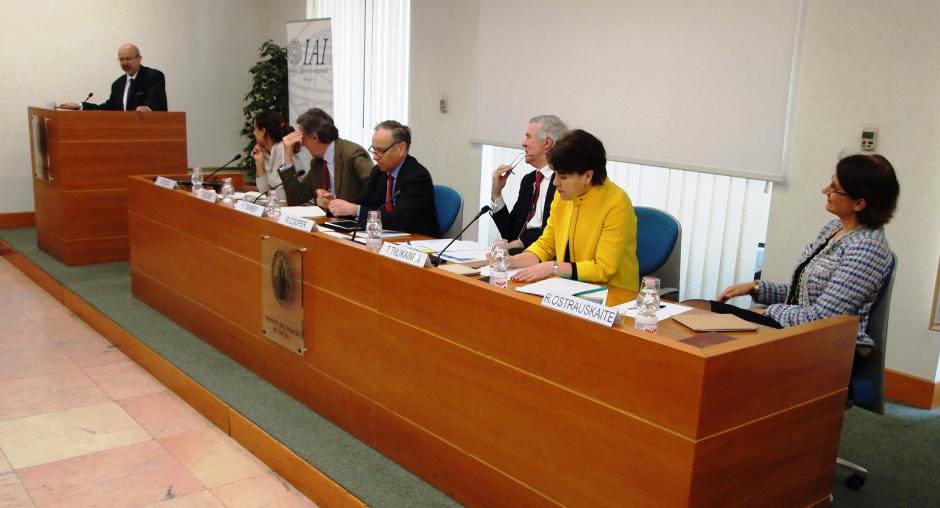The need for a stronger strategic partnership between EU and OSCE emphasized at Rome OSCE-IAI event

The role of the EU and the OSCE in restoring co-operative security in Europe was the focus of a panel discussion organized by the OSCE and the Institute of International Affairs (IAI) in Rome on 8 March 2016. The debate revolved around priorities of the forthcoming EU Global Strategy on Foreign and Security Policy, relations between Europe and Russia as well as findings of the final report of the independent Panel of Eminent Persons on European Security.
IAI President Ferdinando Nelli Feroci opened the event, which brought together more than 70 participants from Italy’s Foreign Ministry and Rome’s diplomatic, academic and media communities.
In his keynote address, OSCE Secretary General Lamberto Zannier encouraged closer co-operation between both organizations and called for a stronger strategic partnership. “Strengthening the EU’s engagement within the OSCE would be beneficial for both organizations. EU support for OSCE activities in Ukraine offers a good example of how well this can work. By increasing its cooperation with the OSCE in other regions, the EU can enhance its own impact,” he said.
Zannier’s remarks were followed by a discussion among Nathalie Tocci, IAI Deputy Director and Special Adviser to High Representative of the EU for Foreign Affairs and Security Policy Federica Mogherini; Thierry Béchet, Permanent Representative of the EU to the OSCE; Teija Tiilikainen, Director of the Finnish Institute of International Affairs and a member of the Panel of Eminent Persons; Robert Cooper, former British diplomat and head of the drafting team for the reports of the Panel of Eminent Persons; and Rasa Ostrauskaite, Deputy Director of the OSCE Conflict Prevention Centre. The discussion was moderated by Fred Tanner, Senior Adviser to the OSCE Secretary General.
Tiilikainen said: “The new EU Global Strategy should strongly support the model of co-operative security in Europe that is represented by the OSCE. The OSCE remains the only multilateral framework where both Russia and the EU sit at one table and can deal with hard-security issues on equal terms.”
According to Tocci, there are no signs that the EU could rapidly restore the relations it had with Russia before the conflict in and around Ukraine. At the same time, the EU needs to move beyond its current strategy, which is mostly reactive. “We need to find a new modus vivendi for dealing with Russia. We should start discussing European issues where we have common interests and where we could co-operate in a pragmatic way, such as infrastructure projects or the energy sector,” Tocci stressed.
Robert Cooper added that a key long-term objective for Europe should be finding a political settlement with Russia when it comes to post-Soviet countries with disputed security status, which are referred to as “states in-between” in the final report of the Panel of Eminent Persons.
The EU Global Strategy on Foreign and Security Policy will be published in June 2016. The final report of the independent Panel of Eminent Persons on European Security mandated by the OSCE Troika was presented at the 22nd OSCE Ministerial Council in Belgrade in December 2015.
